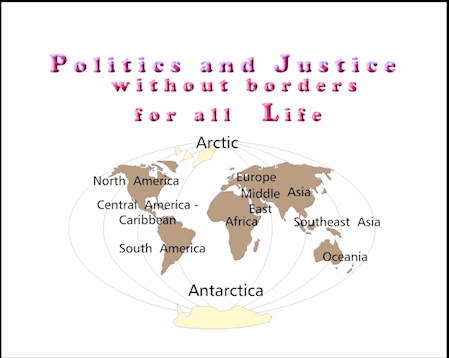
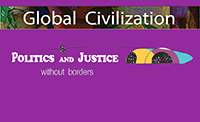

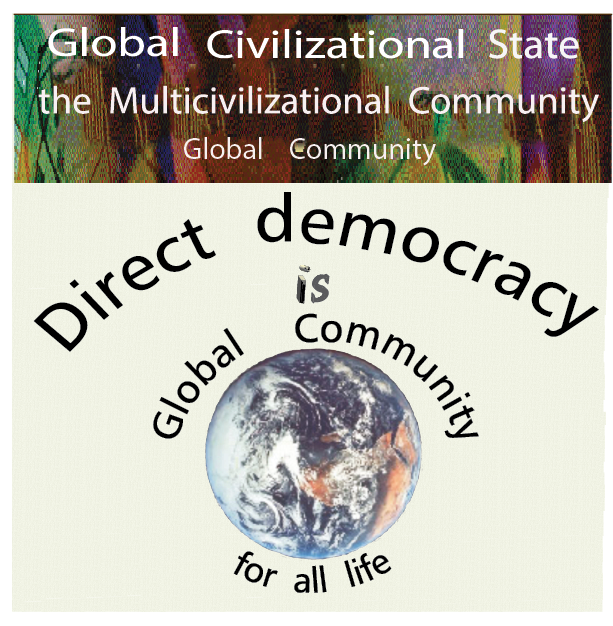
Videos promoting Global Community.
BDMV_Sept_12_2023.mp4
Sequence 01_2.3gp
TB_Sequence 01_1.mp4
Other usefull and helpful Papers to read concerning the theme of this Newsletter:
http://globalcommunitywebnet.com/Dialogue2024/Newsletters/ Nov_December2023/Israel_USA_NATO.html
http://globalcommunitywebnet.com/Dialogue2024/Newsletters/ Nov_December2023/whoownsearth.html
http://globalcommunitywebnet.com/Dialogue2024/Newsletters/ Nov_December2023/Federation_of_GGs.html
http://globalcommunitywebnet.com/Dialogue2024/Newsletters/ Nov_December2023/Parliament.html
http://globalcommunitywebnet.com/Dialogue2024/Newsletters/ Nov_December2023/gpa.html
http://globalcommunitywebnet.com/Dialogue2024/Newsletters/ Nov_December2023/GC_Direct_Democracy.html
http://globalcommunitywebnet.com/Dialogue2024/Newsletters/ Nov_December2023/index_GGNA.html

Theme for this month, Nov_December2023.
Israel and Palestine only one possible solution: Global Parliament, Direct Democracy, and the Scale of Global Rights.
by
Germain Joseph Dufour.
I am
President of Global Parliament
Global Civilizational Community
Multicivilizational Community
Global Community
and also President
of my own Canadian business and website:
Global Community WebNet Ltd.
globalcommunitywebnet.com
Take time to listen to our videos.
Many of the Videos might be too large to open for you on the Internet. Sorry!
And welcome to all of you global citizens.
Other usefull and helpful Papers to read concerning the theme of this Newsletter:
https://globalcommunitywebnet.com/Dialogue2024/Newsletters/
Nov_December2023/Lead_Global_Civilizational_State.htmlhttps://globalcommunitywebnet.com/Dialogue2024/Newsletters/
Nov_December2023/Israel_USA_NATO.htmlhttps://globalcommunitywebnet.com/Dialogue2024/Newsletters/
Nov_December2023/index_Israel_not_a_nation.htmlhttps://globalcommunitywebnet.com/Dialogue2024/Newsletters/
Nov_December2023/whoownsearth.htmlhttps://globalcommunitywebnet.com/Dialogue2024/Newsletters/
Nov_December2023/
indexNEW_ai_DirectDemocracy_NEW_edited5.htmlhttps://globalcommunitywebnet.com/Dialogue2024/Newsletters/
Nov_December2023/Federation_of_GGs.htmlhttps://globalcommunitywebnet.com/Dialogue2024/Newsletters/
Nov_December2023/Lead_Israel_not_a_nation.html#Hammashttps://globalcommunitywebnet.com/Dialogue2024/Newsletters/
Nov_December2023/Parliament.htmlhttps://globalcommunitywebnet.com/Dialogue2024/Newsletters/
Nov_December2023/Global_law_codes_standards.htmlhttps://globalcommunitywebnet.com/Dialogue2024/Newsletters/
Nov_December2023/gpa.htmlhttps://globalcommunitywebnet.com/Dialogue2024/Newsletters/
Nov_December2023/GC_Direct_Democracy.htmlhttps://globalcommunitywebnet.com/Dialogue2024/Newsletters/
Nov_December2023/GlobalVotingontheNet.htmlhttps://globalcommunitywebnet.com/Dialogue2024/Newsletters/
Nov_December2023/GCS_Federation_of_GGs.htmlhttps://globalcommunitywebnet.com/Dialogue2024/Newsletters/
Nov_December2023/Global_Parliament_Federation.htmlhttps://globalcommunitywebnet.com/Dialogue2024/Newsletters/
Nov_December2023/GCS_Global_Ministries.htmlhttps://globalcommunitywebnet.com/Dialogue2024/Newsletters/
Nov_December2023/index_GGNA.htmlhttps://globalcommunitywebnet.com/Dialogue2024/Newsletters/
Nov_December2023/Pictures_best_overall.html
Theme for this month, November 2023.
Let us lead the world toward Global Civilizational State for education, Justice, creating a new nation, and protecting Palestine and all Life on Earth, and for new ways of doing business and trade, in global development and in the management of global resources.
Table of contents.
Paper by
Germain Joseph Dufour
Israel is not a State, not a nation, not a country, not a Global Community, not a democracy and not a government. Israel is the most dangerous USA military base outside America on the planet. At the aftermath of World War II, Joseph Vissarionovich Stalin led the Soviet Union and defeated Adolf Hitler German Army. World War II is a conflict the Soviet Union, officially named the Union of Soviet Socialist Republics(USSR), has won.After seeing that Stalin had won the war against Hitler and, being safe enough to attack the left-over German soldiers in Europe, Allied forces launched a combined naval, air and land assault on Nazi-occupied France. They called this D-Day, which described the first day of a large enough Allied military operation. Because Stalin had already defeated Hitler and won the war, Allied forces could have used "diplomacy" to deal with the left-over Germans in France. Diplomacy would have saved lives and stopped more people from being killed. Diplomacy was not in Allied's blood.
And neither has diplomacy been in the West's blood after World War II. The West was eager to make a hurried decision and ran to the United Nations(UN) to force most nations accept to create "Israel". But the UN never had the legal institution to make such move. Today, we all know that only Global Parliament Constitution could have made such demand possible.
A diplomatic person or institution knows how to approach an idea or cause without unnecessarily inflaming passions or unleashing a catastrophe. That kind of person rarely reacts impulsively to an opposing opinion. Instead, a diplomat tries to reach an agreement with other people in a sensitive and respectful way. What's more, diplomacy creates an environment where states and nations can sit down and hold talks instead of waging wars over every issue. Diplomacy is the reason we have yet not witnessed the 3rd World War.
Over the time since WWII, Israel and America never had the rights to invade Palestine or to dissolve this nation. They never had the rights to do so. Only Global Parliament has the power and rights to create or dissolve a nation. Global Parliament's Constitution is very specific about those rights. The United Nations do not have the rights to create a new nation either, only Global Parliament has the right to do so. Neither the United Nations, and neither the european union countries (EU), have the rights to create or dissolve a nation. Neither of them have a Constitution that they have agreed upon after a democratic vote. Only Global Parliament has such a Global Constitution.
This Global Constitution has an important Chapter which defined and explained the Scale of Global Rights. And the Scale has been voted for and approved democratically shortly after year 1985. The Scale of Global Rights places cultural rights and religious rights in the last section of the Scale, Section no 6.
"Concerning Sections 4, 5 and 6 on the Scale, it shall be the aim of Global Community to secure these other rights for all global citizens within the Federation of all nations, but without immediate guarantee of universal achievement and enforcement."These rights are defined as "Directive Principles, obligating Global Community to pursue every reasonable means for universal realization and implementation." In effect, Section 6 says that cultural rights and religious rights are of lesser importance than all the other rights in Sections 1 to 5. Section 1 being the most important rights and so on Section 6 having the least importance.
The Scale effectively and essentially, say that "Israel" does not exist except in the wild imagination of the Jews or the Jewish people, who are an ethnoreligious group originating from the ancient Hebrews (i.e. Israelites), and whose traditional religion is Judaism.
The real reason why Jews want to take over the land including the Gaza Strip and all the territory of the State of Palestine is very simple: to have the Jews billionaires, the richest people in the world, to use their money to develop the land(s), the Gaza Strip, or simply Gaza, which is a Palestinian exclave on the eastern coast of the Mediterranean Sea, bordered by Egypt on the southwest and "Israel" on the east and north. Together, the Gaza Strip and the West Bank make up the State of Palestine, which has been under "Israeli" military occupation since 1967.
Those Jews billionaires will also develop Gaza not just to build more truly Jewish Homes, i.e. homes filled with ethnic and religious objects--and everyday objects imbued with special meaning. Those Jewish homes will be looking over a very beautiful Mediterranean Sea, but also and most likely, will be used as a tourism attraction and a Bonanza i.e. a very profitable place to sell war collectibles and war art items explaining how the Jews suffered fighting the Palestinian people who were living on the Palestinian territories, the two regions of the former British Mandate for Palestine that have been militarily occupied by "Israel" since the Six-Day War of 1967, namely the West Bank and the Gaza Strip. Here you can buy your art, antiques, crafts, pottery and glasses, and all kinds of everything of religious and sports memorabilia.
Those Jews billionaires, many of them living in the USA, are very powerful in electing the America's government of their liking and paying for the military base in "Israel". All nuclear weapons used by "Israel" come from the United States. Also manufactured and coming from the USA is a large quantity of armaments including heavy duty weaponry and the equipment that's associated with it, like bombs, fighter jets, tanks, and assault rifles. "Israel" is really the most dangerous military base on the planet and has become a platform for the West’s fullscale invasion of the world.
Read Paper:
http://globalcommunitywebnet.com/Dialogue2024/Newsletters/
Nov_December2023/index_Israel_not_a_nation.html
http://globalcommunitywebnet.com/Dialogue2024/Newsletters/
Nov_December2023/index_Israel_not_a_nation.htmlIII. A successful Global Civilizational State for all Life would have the following distinguishing characteristics.

It is impossible within the scope of this paper to describe, compare, and evaluate all past and present civilizations, and conclude that "A successful Global Civilizational State for all Life" would have the following distinguishing characteristics. Nevertheless, let us see what can be found within the context of today civilizations, what are possible surviving solutions for life on Earth, and even attempt to promote a system of global governance consisting of a more meaningful world union in the form of nine or more Global Governments and Global Parliament.
Human history stretches through generations, and is the history of civilizations. Civilization and culture both refer to the overall way of life of a people, and involve the values, beliefs, norms, institutions, social structures, and modes of thinking to which successive generations in a given society. The composition and shapes of civilizations change over time, the cultures of peoples interact and overlap. A short list of values humans have developed over time to survive as a species are shown here.
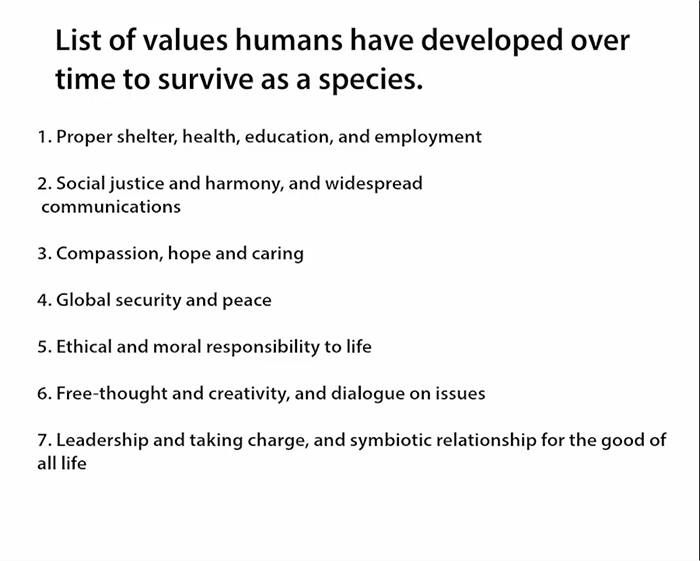
People have shared a few fundamental values and institutions throughout history, which may explain some constants in human behavior but it cannot explain history, which consists of changes in human behavior.
If the term civilization is elevated to what is common to humanity as a whole then the largest cultural groupings of people would be a single Global Civilizational State, that is a variety of cultures, of peoples, of religious worlds, of historical traditions, and of historically formed attitudes.
The development and evolution of the West are in large part the factors which enabled the West to take the lead in modernizing itself and non-Western societies. These factors were truly concepts, practices, and institutions have been more prevalent in the West than in non-Western civilizations. Over time, characteristics of Western civilization have been defined by religion and moral principles, human rights, language, ancestry, history, ethnic groups, customs and laws, and also by maintaining a meaningful independent existence, and ways of life. America is the distinct core-state civilization of the West. Inevitably, the fate of the United States within the West grouping of states depends upon Americans asserting strongly once more their commitment to Western civilization and today, their commitment to the Global Civilizational State which is seen by global citizens as the guardian, custodian and embodiment of Western civilization.
The effect of the expansion of the West has promoted both the modernization and the Westernization of non-Western societies. However modernization does not necessarily mean Westernization. Non-Western societies can modernize and have modernized without abandoning their own cultures and adopting wholesale Western values, institutions, and practices. In short, modernization has meant a great victory and achievement of Global Civilizational State on Earth.
The attitudes, values, knowledge, and culture of people in a modern society differ greatly from those in a traditional society. As the first civilization to modernize, the West leads in the acquisition of the culture of modernity. As other societies acquire similar patterns of education, work, wealth, and class structure, the argument runs, this modern Western culture will become the new culture for Global Civilizational State. Modern societies could resemble each other more than do traditional societies because the increased interaction among modern societies may not generate a common culture but it does facilitate the transfer of techniques, inventions, and practices from one society to another with a speed and to a degree that were impossible in the traditional world.
The components of order in today's more complex and heterogenous world are found within and between civilizations. The world will be ordered on the basis of civilizations or not at all. In this world the core states of civilizations are sources of order within civilizations and, through negotiations with other core states, between civilizations.
Because of modernization, global politics today is being reconfigured along cultural lines and civilizations. And of course, Global Civilizational State is finally giving its historical place as the global solution to saving humanity, and all other lifeforms on Earth, from complete extinction. Peoples and countries with similar cultures are coming together. Alignments defined by ideology and superpower relations are giving way to alignments defined by culture and civilization. A civilization may also include people who share in and identify with its culture, but who live in states dominated by members of another civilization. Civilizations usually have one or more places viewed by their members as the principal source or sources of the civilization's culture. These sources are often located within the core state or states of the civilization, that is, its most powerful and culturally central state or states.
In modern era, Western civilization, the West, is referred to the European-American civilization and America has become the land of freedom, equality, opportunity, the future, and is a distinct core-state civilization. Not so much ideologies, simply economics and politics now differentiate peoples of different civilizations. Nevertheless, cultures, ways of life, ways of doing things have been the most distinguishing characteristics. Those characteristics have been defined by religion, language, ancestry, history, communities, ethnic groups, customs, nations, and also by major levels of classification being civilizations.
In a multicivilizational world, there are core values which different ethnic and religious societies have in common. The constructive course is to renounce global culture, accept diversity, and seek commonalities. Commonalities exist between Asia and the West. Whatever the degree to which humankind is divided, the world's major religions, Western Christianity, Orthodoxy, Hinduism, Buddhism, Islam, Confucianism, Taoism, Judaism, also share key values in common. A more inclusive Global Civilizational State can emerge gradually through the exploration and expansion of these commonalities. Peace in a multicivilizational world is the finding of those commonalities and so peoples in all civilizations should search for and attempt to expand the values, institutions, and practices they have in common with peoples of other civilizations.
IV. Federation of Global Governments.

The Global Government of North America ( GGNA ) is certainly a good example of a type of Global Government. Welcome to your Global Community, the Multicivilizational Community, and Global Civilizational State, and let us all continue to strengthen Direct Democrac and world institutions in ways that would further decrease the risk of human extinction.
Earth Court of Justice (for a government model based on a democratically elected Global Government). In 2024, Global Community celebrates its 39th year since its formation in 1985. More significant and meaningful actions needed to save the Earth, all Life. Watch animation promoting participation. (41 MBs) Global Community will celebrate its 35th year in 2020. Prepare now! More significant and meaningful actions needed to save the Earth, all life. Global Civilizational State dependable and trustworthy leadership to guard over and care for all life on Earth.

A group project for you, could be a school project: send us your own short version of Global Parliament's Constitution. It has to be developed from the actual longer version approved by Global Parliament. Depending on the level of participation, we may have different categories for this special project.
Global Parliament will be reviewing all proposals.
During the Ceremonies of Global Dialogue 2010,a special Award
will be given to the group with the best short version.
Global Parliament Legislative acts
Ratification of Global Parliament's Constitution
Read the Table of Contents of Global Parliament's Constitution.
The 29 Chapters of Global Parliament Constitution
[ Preamble ] [ Chapter I ] [ Chapter II ] [ Chapter III ] [ Chapter IV ] [ Chapter V ] [ Chapter VI ] [ Chapter VII ] [ Chapter VIII ] [ Chapter IX ] [ Chapter X ] [ Chapter XI ] [ Chapter XII ] [ Chapter XIII ] [ Chapter XIV ] [ Chapter XV ] [ Chapter XVI ] [ Chapter XVII ] [ Chapter XVIII ] [ Chapter XIX ] [ Chapter XX ] [ Chapter XXI ] [ Chapter XXII ] [ Chapter XXIII ] [ Chapter XXIV ] [ Chapter XXV ] [ Chapter XXVI ] [ Chapter XXVII ] [ Chapter XXVIII ] [ Chapter XXIX ]
A) How 'Direct Democracy' works: GlobalVotingontheNet.htm
B) Development report on Direct Democracy
C) Global Community overall picture on Direct Democracy
Global Community stands for a Direct Democracy based on the fact that land, air, water, oil & gas, all minerals, space, and the electromagnetic spectrum are all natural resources, and rightly belong to Global Community as a birthright, and they are for sharing as per the Scale of Global Rights. It is about Politics and Justice without borders for all Life on Earth. And it is about our Global Community Constitution meaning.
Global Community must now direct the wealth of the world towards the building of local-to-global economic democracies (Direct Democracy) in order to meet the needs for food, shelter, universal healthcare, education, and employment for all. ![]()
Direct Democracy implies that:
Direct Democracy and global voting on issues ![]()
Global Community stands for a Direct Democracy.
![]()
Global Community, what we stand for.
![]()
Global Community, a global Direct Democracy for all Peoples.![]()
What makes Life on planet Earth habitable for all species?![]()
Humanity's new Vision of the world.![]()
Global Community is Earth for all Life.![]()
What makes Earth suitable for all life? ![]()
VI. Global law, codes and standards aspects and issues. ![]()
VII. How we can save the world from extinction, and the complete disappearance of species from Earth. ![]()
VIII. Replacing the 1948 Universal Declaration of Human Rights by the Scale of Global Rights Scale of Global Rights. ![]()
Global Civilizational State: the application of the Scale of Global Rights to the most important global issues threatening humanity's survival worldwide.
![]()
![]()
![]()
![]()
![]()
![]()
![]()







XI. Global Community Direct Democracy,
the Multicivilizational Community,
and Global Civilizational State. ![]()
Global Community stands for a Direct Democracy based on the fact that land, air, water, oil & gas, all minerals, space, and the electromagnetic spectrum are natural resources, and rightly belong to Global Community as a birthright, and they are for sharing as per the Scale of Global Rights.
XII. Sustainable Global Civilization. ![]()
XIII. Global Protection Agency (GPA). ![]()
To act as a Global Protection Agency, as the GPA aspires to do, many foundations must be laid, especially regarding the move from wielding power derived from Global Parliament to legitimate global leadership. There are many required characteristics that are prerequisite for legitimate leadership.
Building global communities requires a mean to enforce global law that protects all life on Earth.
GCEG Global Protection Agency will train and lead a global force, bypassing traditional peacekeeping and military bodies such as the United Nations and NATO. This is a great opportunity for globallateralism.
Global Protection Agency (GPA) is leading a group of people in the world who participate in:
a) peacekeeping or peacemaking mission;
b) creating global ministries for: ![]()
1. the policy response to the consequences of the global warming, and
2. the development of strategies to adapt to the consequences of the unavoidable climate change.

d) saving the Earth's genetic heritage;
e) keeping the world healthy and at peace;
f) protecting the global life-support systems and the eco-systems of the planet;
g) dealing with the impacts of: global poverty, lack of drinking water and food, global warming and the global climate change, threat to security, conflicts and wars, lack of good quality soil for agriculture, polluted air, water and land, overcrownded cities, more new and old diseases out of control, widespread drugs, human and Earth rights abuses, world overpopulation, and lack of resources;
h) broadening the traditional focus of the security of states to include both the security of people as well as that of the planet. Global security policies include:
* every person on Earth has a right to a secure existence, and all states have an obligation to protect those rights
* prevention of conflicts and wars; identification, anticipation, and resolving conflicts before they become armed confrontations. The Earth Court of Justice will help here.
* military force is not a legitimate political instrument
* weapons of mass destruction are not legitimate instruments of national defence
* eliminate all weapons of mass destruction from all nations and have inspectors verifying progress to that effect
* all nations should sign and ratify the conventions to eliminate nuclear, chemical and biological weapons
* the production and trade in arms should be listed as a criminal act against humanity; this global ministry will introduce a Convention on the curtailment of the arms trade, a provision for a mandatory Arms Register and the prohibition of the financing or subsidy of arms exports by governments
* the development of military capabilities is a potential threat to the security of people and all life on Earth; the ministry will make the demilitarization of global politics a high priority.
* anticipating and managing crises before they escalate into armed conflicts and wars
* maintaining the integrity of the environment and global life-support systems
* managing the environmental, economic, social, political and military conditions that threatened the security of people and all life on the planet.
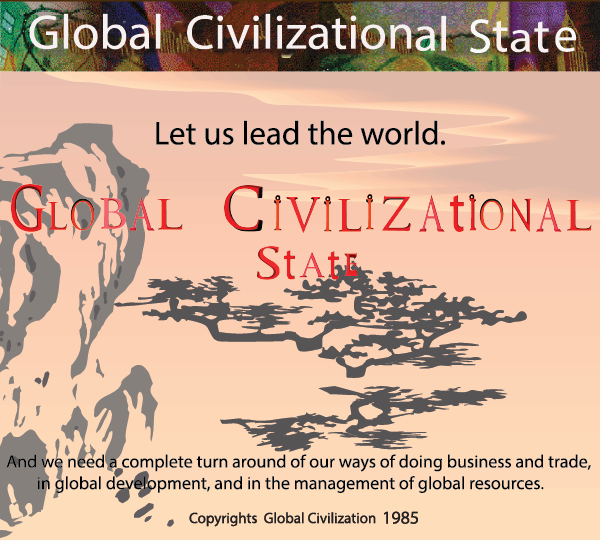 |
|
As global crises of all sorts further intensify, Global Civilizational State may have no alternative but to show solidarity and help each other out of crises, and such solidarity can only be built on the basis of harmony and moderation, and on respecting the political and cultural diversity of our troubled world. A Global Civilizational State dependable and trustworthy leadership for all life on Earth has been on the horizon consistently doing good work. Let us all lead the world toward Global Civilizational State. |
||||
 |
|
Ever since the beginning of the industrial revolution, global crises have aggravated beyond safety bounds. Several important causes of global warming, climate changes, and the life extinction crisis have brought about an existential threat to humanity and of the other life forms on our planet. Mitigation involves attempts to slow the process of global climate change, usually by lowering the level of greenhouse gases in the atmosphere. So far this attempt has not been successful.
|
||||
 |
|
In a finite world, economic and population growth cannot continue indefinitely and must end when resources are exhausted. |
||||
 |
Capitalism has been a failure of our democratic system of governance. Capitalism is this system that can only lead us to our annihilation. Capitalism is an economic system based on exponential growth world over. This system is forcing us to work harder to surpass previous years Gross Domestic Product (GDP) numbers, and is driven by competition, which creates more pollution that impairs life, and the CO2 that's heating the biosphere will end life on Earth if the system is maintain to its exhaustion. We must reduce emissions of greenhouse gases beginning now, and Global Civilizational State also strongly opposes environmental, economic, population, and military warfares.
|
||||
 |
|
But today, many countries have already prioritized economic growth over social, environmental and human right aspects of life. Free trade is itself a fragrant abuse of democracy. Corporate America overriding goal is maximal profits and not the needs and welfare of future generations. The enormous productive capacities and market forces of the planet have been committed to satisfying human needs and desires with little regard to the short and long terms future of life on the planet.
|
 |
Earth environmental governance can only be achieved successfully within the larger context of sustainable development and Earth management because human activities are all interconnected and dependent to one another. A legally imposed contraction of the fossil energy supply and a rapid conversion to renewable energy, are necessary steps toward savings humanity. The goal of the developed nations must be to overturn our present expansionary economic system by fostering de-growth. To accomplish this people must control and manage Earth resources at all stages: exploration, development, production, transportation, manufacturing, and distribution.
|
||||
 |
| And we need a complete turn around of our ways of doing business and trade, in global development, and in the management of global resources. Global Civilizational State has included morality and ethics into our ways of doing business and trade, and into consumer understanding and use of each product on the market. Furthermore and most importantly, we must replace the United Nations by Global Parliament with the immediate action to form the Global Trade and Resources Ministry as promoted by Global Civilizational State, a more meaningful union in the form of nine or more Global Governments. A Global Government is concerned not only with economics and trade, but also with the environment, social, cultural and many other essential services. The Federation of Global Governments is the place of meeting between them. | ||||
We welcome new participants and authors. Free registration. No fees. All for humanity and life on Earth. Check Global Community volunteers site.
Vision of the world to save all life on our planet, Earth.
|






